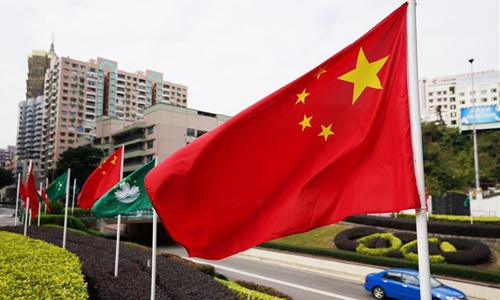IN-DEPTH / DIPLOMATIC CHANNEL
'One country, two systems' key to Macao's development: Portuguese Ambassador to China

China's national flags and flags of China's Macao Special Administrative Region (SAR) are seen along a road in Macao, south China, Dec. 17, 2019. Over the past two decades, the special administrative region has made great strides in economic development and achieved prosperity and stability under the "one country, two systems" principle. Photo: Xinhua
The implementation of the "one country, two systems" principle is key to the progress the special administrative region has made over the past 20 years, Portuguese Ambassador to China Jose Augusto Duarte told the Global Times in an exclusive interview.
Friday marks the 20th anniversary of Macao's return to the motherland. Duarte said Portugal and Portuguese people are "very happy" for the remarkable development that the former Portuguese colony has experienced.
"Material and human and social development make real progress in this special administrative region to which my country is emotionally connected and for which we are naturally happy," he said.
"All this was possible because the 'one country, two systems' principle was respected and implemented. We wish then the continuation of the implementation of this principle which gives very special autonomy and privileges to Macao," the ambassador noted.
Recently, Portuguese President Marcelo Rebelo de Sousa sent a letter to Chinese President Xi Jinping and Portuguese Prime Minister António Costa made a statement to the media, both highly commending the economic and social development along with the successful implementation of the "one country, two systems" principle in Macao over the past 20 years since its return to China.
Portugal's top leaders said that Portugal-China relations will continue to serve as a unique example of countries with different political systems and cultural traditions co-existing in harmony and that Macao will make greater contributions to the comprehensive strategic partnership between Portugal and China.
Macao had been under colonial rule by Portugal for more than 300 years.
As China aims to turn Macao into a trade and business center for Portuguese-speaking countries, Duarte told the Global Times that "Portugal is quite enthusiastic with this initiative which aims something that would benefit all the countries involved."
Macao is already a natural cultural platform linking China to Portuguese-speaking countries, but the goal now is to go beyond culture and pursue the economy, for trade and investment, he said. "Portugal has always been present in those meetings and we supported since the beginning with no hesitation this opportune and constructive project," he said.
To better implement this project, the ambassador said it would be important that Macao could become a platform facilitating trade between those Portuguese-speaking countries and China.
"Importing from Macao and exporting for Macao from those countries should mean a real port and connection with the overall Chinese market. This would benefit all sides involved and above all, it would benefit Macao and the project itself," he said.

